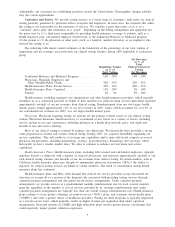Quest Diagnostics 2007 Annual Report Download - page 19
Download and view the complete annual report
Please find page 19 of the 2007 Quest Diagnostics annual report below. You can navigate through the pages in the report by either clicking on the pages listed below, or by using the keyword search tool below to find specific information within the annual report.Most of our agreements with major health insurance plans are non-exclusive arrangements. Certain health
insurance plans, however, have been increasingly willing to limit the laboratory network to only a single national
laboratory to obtain improved pricing. In cases where members choose to use a non-contracted provider due to
service, quality or convenience, the non-contracted provider is generally reimbursed at rates considered
“reasonable and customary.” Contracted rates are generally lower than “reasonable and customary” rates because
of the potential for greater volume as a contracted provider. A non-contracted clinical test service provider with
quality and service preferred by physicians and patients to that of contracted providers could potentially realize
greater profits than if it was a contracted provider, provided that physicians and patients continue to have choice
in selecting their clinical test provider and any potential additional cost to the patient of using a non-contracted
provider is not considered prohibitive.
We also may be a member of a “complementary network.” A complementary network is generally a set of
contractual arrangements that a third party will maintain with various providers that allow for discounted fees for
the benefit of members of the customers that arrange access through the third party. A member of a health
insurance plan may choose to access a non-contracted provider that is a member of a complementary network; if
so, the provider will be reimbursed at a rate negotiated by the complementary network.
We offer QuestNetTM, a service in which we develop and administer customized networks of clinical test
providers for health insurers. QuestNetTM networks provide physicians and patients multiple choices for clinical
testing. Health insurance plans that use these networks realize cost reductions by reducing testing performed by
non-contracted providers and from simplified payment administration for clinical testing services.
Hospitals and Other Laboratories. Hospitals generally maintain an on-site laboratory to perform testing on
patients and refer less frequently needed and highly specialized procedures to outside laboratories, which typically
charge the hospitals on a negotiated fee-for-service basis. Fee schedules for hospital reference testing are typically
negotiated on behalf of the hospitals by group purchasing organizations. We believe that most hospital
laboratories perform approximately 90% to 95% of their patients’ clinical tests. We provide services to hospitals
throughout the United States that vary from esoteric testing, to helping manage their laboratories, to serving as
the medical directors of the hospital’s histology or clinical laboratory. We believe that we are the industry’s
market leader in servicing hospitals. Hospitals generally continue to look for ways to fully utilize their existing
laboratory capacity: they perform tests needed by their patients and compete with commercial laboratories for
outreach (non-hospital patients) testing. Continuing to obtain referrals from hospitals depends on our ability to
provide high quality services that are more cost-effective than if the hospitals were to perform the services
themselves. We believe that our combination of full-service, bi-coastal esoteric testing capabilities, medical and
scientific professionals for consultation, innovative connectivity products, focus on Six Sigma quality and
dedicated sales and service professionals has positioned us to be an attractive partner for hospital customers.
Most physicians have admitting privileges or other relationships with hospitals as part of their medical
practice. Many hospitals leverage their relationships with community physicians and encourage the physicians to
send their outreach testing to the hospital’s laboratory. In addition, hospitals that own physician practices
generally require the physicians to refer tests to the hospital’s affiliated laboratory. Hospitals can have greater
leverage with health insurers than do commercial clinical laboratories, particularly hospitals that have a significant
market share; hospitals thus are frequently able to negotiate higher reimbursement rates with health insurance
plans than commercial clinical laboratories for comparable clinical testing services.
We also have joint venture arrangements with leading integrated healthcare delivery networks in several
metropolitan areas. These joint venture arrangements, which provide testing for affiliated hospitals as well as for
unaffiliated physicians and other healthcare providers in their geographic areas, serve as our principal laboratory
facilities in their service areas. Typically, we have either a majority ownership interest in, or day-to-day
management responsibilities for, our hospital joint venture relationships.
We also provide testing services to federal, state and local governmental agencies, and perform esoteric
testing services for other commercial clinical laboratories that do not have a full range of testing capabilities.
These customers are charged on a fee-for-service basis.
Insurers and Employers. We provide services to life insurance companies and employers. Life insurance
companies use clinical tests and other services we provide to assist in making policy issuance and premium
rating decisions. Factors such as the number of applications for fully-underwritten life insurance policies can
affect the utilization of clinical testing and other services we provide to our insurance customers. We seek to
grow our insurance revenues by increasing our market share and by offering new and innovative clinical tests and
other services. Our life insurance customers have been consolidating, which has resulted in increased individual
customer purchasing power. We expect that this trend will continue. We charge our life insurance customers on a
fee-for-service basis, typically under multi-year agreements.
10
























